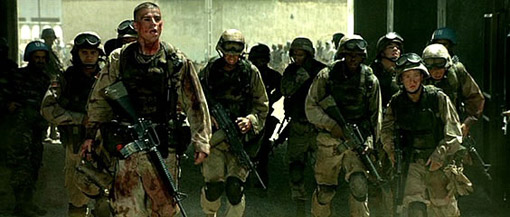Are You With Us?: Black Hawk Down
By Ryan Mazie
January 21, 2013
Director Scott does a breathtaking job of making the exhilarating war scenes not an act of action entertainment, but scenes of intense drama. Shot with bleak color palettes (not the oranges and blues of most "action" war films), there is a bit of a hopeless overcast in terms of the visual tone (thanks to cinematographer Slawomir Idziak). Scott perfectly captures the immense confusion of war, yet has an excellently established field of space for his action sequences. Pietro Scalia deservedly won the Best Editing Academy Award for the film, skillfully splicing together the lengthy and technical combats. A film of extremely quick cuts, Scalia knows when to show and when to pull back. The gore is not excessive, but shown just enough to get the point to hit home (and your stomach). With the aide of Scott, the length of the scenes between the missions are balanced perfectly, jumping soldier to soldier without staying too long for interest to start fading, yet not being away for too long for audiences to start forgetting who is where and up to what.
Leading man of yesterday Josh Hartnett (something went horribly wrong in the mid-2000s with his career) has the most notable role as a Staff Sergeant who suddenly finds himself put in a leading position. Ewan McGregor also is given a fair share of screen time as a paper pusher who finally gets his chance at holding a gun instead of a coffee cup. Familiar faces like Tom Sizemore, Eric Bana, Sam Shepard, William Fichtner, Tom Hardy, Ty Burrell, Hugh Dancy, Orlando Bloom, Jeremy Piven, and a whole list of others also show up on the screen, but are blurred into anonymity with their battle helmets on.
Not nominated for any major Oscars outside of Best Director for Scott, the film’s name was called up onto the stage twice - once for editing and once for sound. I was surprised to have not seen it up for Best Picture, but I assume the divide over the side-less approach the film took had enough detractors to get it out of the winners’ circle.
Similar to Zero Dark Thirty, Black Hawk Down opened on two screens in New York and Los Angeles on December 28, 2001 to qualify for Oscars. After three scorching weeks in limited release, the film popped when it went wide over Martin Luther King weekend, raking in $33.6 million over the four days (the highest-ever at the time). Weak competitions and low declines kept the film on top of the charts for another two weeks. In the end, Hawk took down $108.6 million ($152.4 million adjusted) against a $92 million budget. Overseas numbers were surprisingly low, adding only an addition $64.4 million in foreign coin to the total.
A deft look at the atrocity and camaraderie that happens during war, Black Hawk Down is a succinct account that is less about politics and more about the life of the battlefield. If you are expecting to go into the film to learn about the situation in Somali, then this is not the movie for you, and a point I feel that many of the critics missed, not seeing its main intention. Solidifying his place as one of the best action directors of our time, Scott has another film to add to his impressive resume that has sadly yet to earn him a Best Director statue.
A mix of horror and heroics, Black Hawk Down is an epic condensation of 18 hours of warfare into a tight two and a half hour suspenseful drama. Black Hawk Down is one of Scott’s finest; an account of war whose only fault is that it sometimes tells just a little too much.
Verdict: With Us
9 out of 10
Continued:
1
2
|
|
|
|




